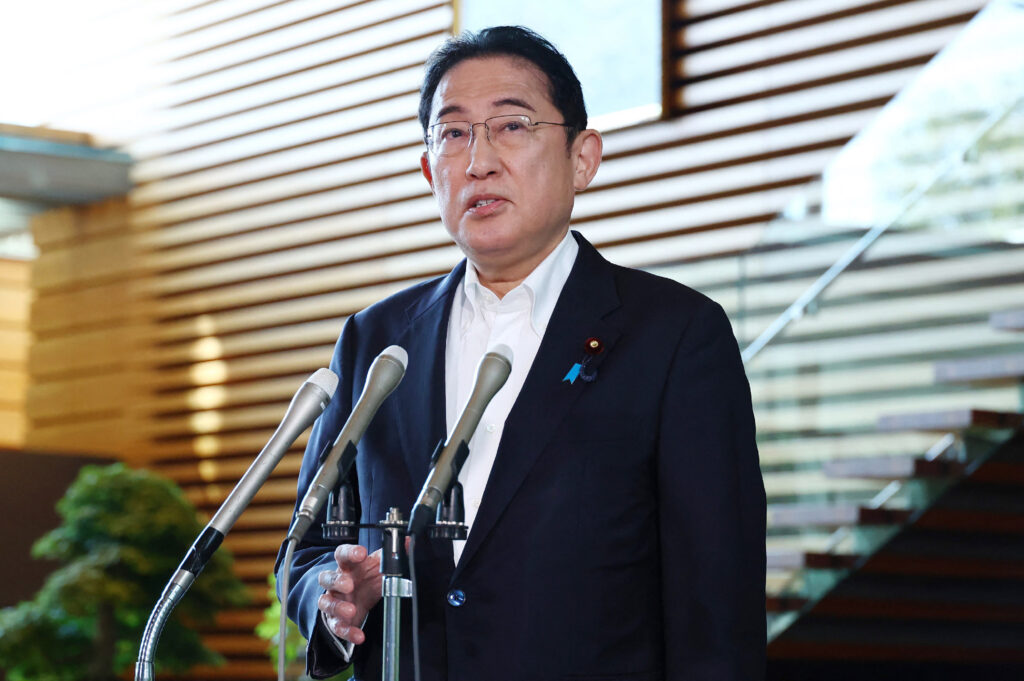
- ARAB NEWS
- 01 Aug 2025

TOKYO: Outgoing Japanese Prime Minister KISHIDA Fumio will leave many diplomatic tasks unfinished, such as improving relations with China, although he engaged in summit diplomacy leveraging his four years and seven months of experience as foreign minister.
Kishida has paved the way for deepening Japan’s alliance with the United States and improving its relations with South Korea. But he made little progress in resolving the issue of abductions of Japanese nationals by North Korea decades ago.
The pending issues will be passed to his successor, who will be chosen at the ruling Liberal Democratic Party’s presidential election in September.
“I was able to achieve great results through multifaceted diplomacy,” Kishida told a press conference Wednesday, when he made a surprise announcement that he will not seek re-election as LDP president and step down as prime minister after the party race.
Regarding China and North Korea, Kishida said he will strive to advance the relations with them as much as he can during his remaining term, admitting he is only halfway to making progress.
Advocating what he called “realism diplomacy for a new era,” Kishida prioritized the Japan-U.S. alliance as the cornerstone of diplomacy and security and decided to drastically strengthen defense capabilities in line with the U.S. concept of integrated deterrence.
Building a close relationship with U.S. President Joe Biden and calling him a friend, Kishida visited the United States as a state guest in April.
But Kishida has failed to decide when to start implementing tax increases to finance the planned defense spending boost. Another unfinished task is detailed work needed to carry out plans to strengthen command and control coordination between the Self-Defense Forces and the U.S. military as agreed with Biden in April.
Kishida’s successor will need to build a relationship of trust with the next U.S. president emerging from the November election. The Republican candidate is former President Donald Trump, who once mentioned the idea of withdrawing U.S. forces from Japan.
Another headache will be China, which does not hide its hegemonic ambitions.
Kishida agreed with Chinese President Xi Jinping to build a mutually beneficial strategic relationship in their meeting in November last year, but he remains unable to visit China.
This is due chiefly to pending issues including Beijing’s ban on Japanese fishery products introduced in protest to the releases into the sea of tritium-containing treated water from Tokyo Electric Power Company Holdings Inc.’s stricken Fukushima No. 1 nuclear power plant.
By contrast, Japan’s relations with South Korea have improved markedly since President Yoon Suk-yeol took office in May 2022, seven months after the Kishida administration began.
After Yoon announced a solution to the thorny bilateral issue of wartime labor, the two leaders agreed to normalize their countries’ relations, which had fallen to the worst level in the post-World War II period.
“We must make the normalization even more certain,” Kishida said at Wednesday’s press conference, leaving the job to the next prime minister.
Kishida was eager to resolve the abduction issue as the families of the abductees advance in age. He proposed starting high-level talks directly under the prime minister to realize a summit with North Korean leader Kim Jong Un.
In March this year, however, North Korea declared that it will not negotiate with Japan. The proposed Kishida-Kim meeting did not come true.
Kishida also worked to strengthen ties with Global South emerging and developing countries.
But he had to cancel his visit to Kazakhstan, Uzbekistan and Mongolia this month after a powerful earthquake occurred off Miyazaki Prefecture, southwestern Japan, triggering the country’s first emergency information warning of an increased risk of a huge earthquake in the Nankai Trough off the Pacific coast.
Kishida told leaders of the three countries to reschedule the trip over the telephone. But a Japanese Foreign Ministry official said that it is up to the next prime minister whether to visit the countries.
JIJI Press